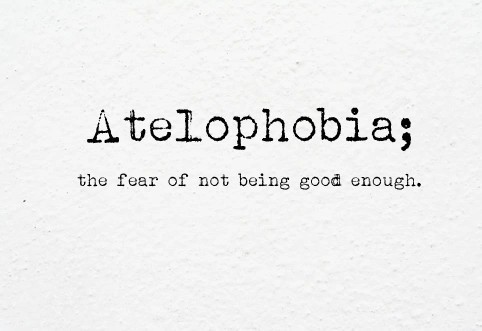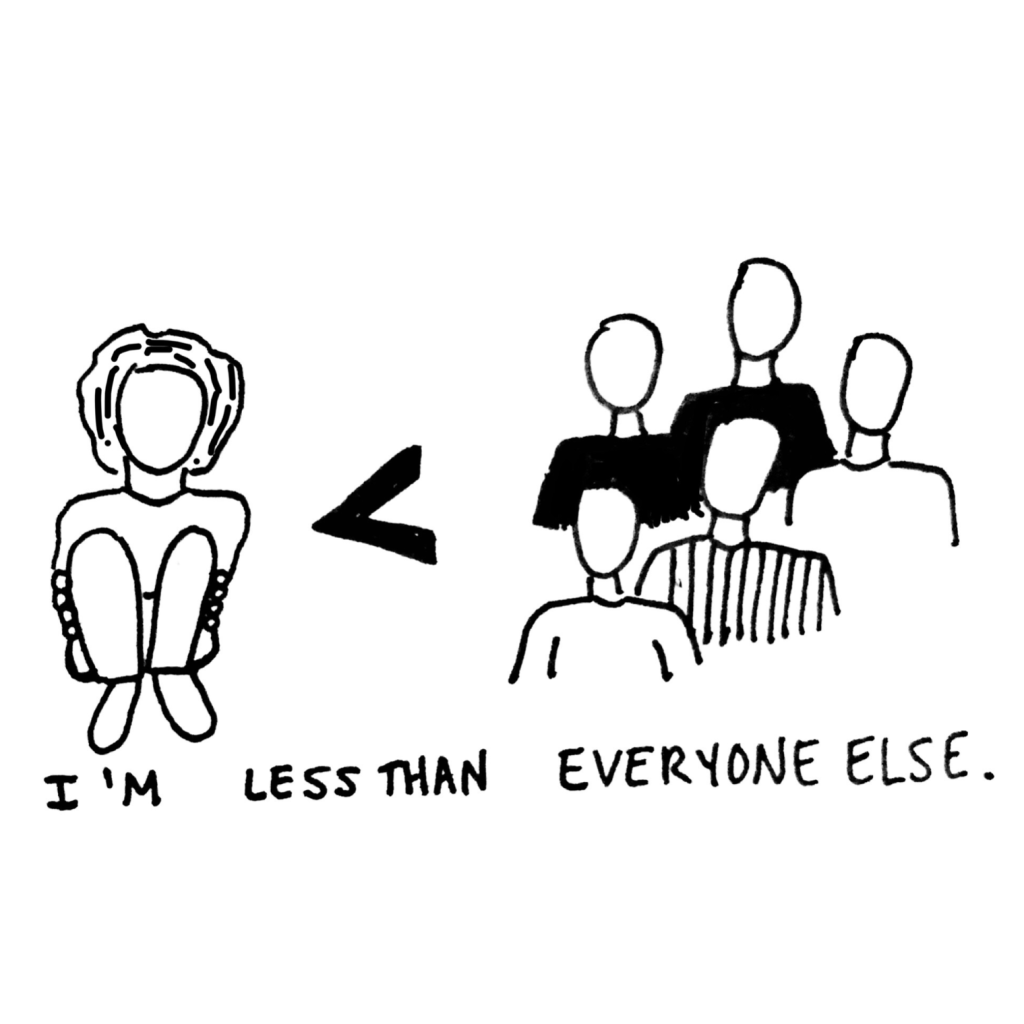Do you often feel like you’re just not good enough? That no matter what you do, you can’t seem to measure up? If so, then you are not alone. Inadequacy is a feeling (or feelings of inadequacy) that many people experience at some point in their lives. This article will explore the concept of inadequacy, its types, signs and symptoms, causes, and therapies.
Contents
Understanding Inadequacy

Inadequacy is a feeling of not being good enough or up to par. It can be caused by many different factors, including low self-esteem, perfectionism, and social comparison. Inadequacy can manifest in many different ways, such as feelings of self-doubt, insecurity, guilt, and shame.
NOTE: Atelophobia is the fear of not being good enough. People with atelophobia often feel like they are never good enough and that they can’t do anything right. They may have a hard time accepting compliments and tend to be very self-critical.
Types Of Inadequacy
There are many different types of inadequacy. Some of the most common ones include:
Social Inadequacy: This type of inadequacy refers to feeling like you’re not good enough in social situations. You may feel shy and uncomfortable around others, or like you don’t know how to act around them.
Performance Inadequacy: This type of inadequacy refers to feeling like you’re not good enough in your professional or academic pursuits. You may feel like you’re not smart or talented enough, or that you can’t keep up with others.
Relationship Inadequacy: This type of inadequacy refers to feeling like you’re not good enough in your romantic relationships. You may feel like you’re not attractive or interesting enough, or that you can’t make your partner happy.
Body Image Inadequacy: This type of inadequacy refers to feeling like your body is not good enough. You may have unrealistic expectations for your appearance, or be overly critical of yourself.
Signs And Symptoms Of Inadequacy
In addition to feeling like you’re not good enough, there are also many signs and symptoms of inadequacy. Some of the most common ones include:
Feeling self-doubt or insecurity: You may constantly question your abilities and feel like you can’t do anything right.
Comparing yourself to others: You may compare yourself to others and always come up short.
Feeling ashamed or embarrassed: You may feel ashamed or embarrassed of your shortcomings and feel like you have to hide them from others.
Feeling guilty: You may feel guilty about the things you’ve done wrong, even if they’re not your fault.
Avoiding new challenges or opportunities: You may avoid new challenges or opportunities because you don’t think you’re capable of doing them.
Having difficulty accepting compliments: You may not believe that people are complimenting you genuinely, or you may dismiss their compliments as being untrue.
Causes Of Inadequacy

In many cases, the reasons or roots of inadequacy are psychological. Some of the most common ones include:
Low self-esteem: If you have low self-esteem, you may feel like you’re not good enough. You may doubt your abilities and see yourself in a negative light.
Social comparison: When we compare ourselves to others, it can lead to feelings of inadequacy. We may feel like we can’t live up to the standards that others have set for us.
Childhood abuse or neglect: If you were abused or neglected as a child, you may feel like you’re not good enough because that’s what you were told repeatedly by your caregivers.
Negative thinking patterns: If you tend to think negatively, you may be more likely to experience feelings of inadequacy. This is because negative thoughts can cause us to question our worth and abilities.
Traumatic life events: If you’ve experienced a traumatic event, such as a death in the family or a natural disaster, you may feel like you’re not good enough because everything seems so unfair.
Perfectionism: People who are perfectionists may feel like they’re never good enough because they’re constantly striving for excellence.
Inadequacy Vs. Insecurity
There is a big difference between feeling inadequate and feeling insecure. Insecurity is often based on your thoughts and perceptions, while inadequacy is based on reality. You may feel insecure about something even if you are objectively competent in that area.
In contrast, you may feel inadequate even if you are very successful in that area. This is because feelings of inadequacy are based on your internal standards, which may be unrealistic or unattainable.
Living With Inadequacy
In addition to causing problems in our personal lives, inadequacy can also lead to mental health issues. People who feel inadequate often experience:
Anxiety: If you constantly feel like you’re not good enough, it’s natural for you to feel anxious about your situation. You may worry about what others think of you and be afraid of being judged.
Depression: Feelings of inadequacy can often lead to depression. When you feel like you’re not good enough, it’s easy to feel hopeless and worthless.
Eating disorders: People who struggle with feelings of inadequacy often have unhealthy relationships with food. They may be overly restrictive or binge eat as a way to comfort themselves.
Self-harm: In some cases, people who feel inadequate may turn to self-harm as a way to cope with their feelings.
Suicidal thoughts: Feelings of inadequacy can be incredibly painful and lead to suicidal thoughts. If you’re experiencing these thoughts, it’s important to get help right away.
Inadequacy And Relationships
In addition to impacting our mental health, inadequacy can also harm our relationships. People who feel inadequate often:
Are less likely to form relationships: People who feel inadequate often have trouble connecting with others. They may be afraid of being rejected or criticized by others.
Are more likely to experience relationship problems: Inadequate people are more likely to have arguments with their partners and less likely to be satisfied with their relationships.
Are more likely to end relationships: Inadequate people are also more likely to end relationships. This may be because they feel like they’re not good enough for someone else or that they’re not worth being in a relationship.
Inadequacy And Work Life
In addition to causing problems in our personal lives and leading to mental health issues, inadequacy can also harm our work life. People who feel inadequate often:
Have difficulty accepting feedback: If you’re constantly feeling like you’re not good enough, it’s tough to take feedback positively. You may feel like any criticism is a personal attack.
Have low self-confidence: When you feel inadequate, it’s difficult to have high self-confidence. This can make it tough to put yourself out there and take risks in your career.
Feel like a fraud: Many people who feel inadequate often feel like they’re a fraud and that someone will eventually find out that they’re not qualified for the job.
Be less productive: When we feel like we’re not good enough, it’s difficult to be productive. Inadequate people often have trouble focusing on their work and may feel overwhelmed by tasks.
Experience more stress: Feelings of inadequacy can cause a lot of stress. This is because we’re constantly worried about whether or not we’re good enough.
Feel like they’re not good enough to succeed: You may feel like you’re not good enough to achieve your goals and reach your full potential.
Have difficulty getting promoted: Inadequate people may not be seen as good potential leaders because they don’t believe in their abilities.
Coping With Inadequacy

Many people live with feelings of inadequacy daily. It can be difficult to cope with these feelings, but some things can help. Some tips include:
Talk to someone: If you’re finding it difficult to cope with your feelings, talk to someone about them. A friend, family member, or therapist can all be great sources of support.
Write down your thoughts: When you’re feeling overwhelmed, writing down your thoughts can be helpful. This will allow you to process them and may make them less overwhelming. While writing:
- Challenge your negative thoughts: When you start to think negatively, challenge those thoughts and ask yourself whether they’re true.
- Focus on your strengths: Instead of dwelling on your weaknesses, focus on your strengths and try to build upon them.
Accept compliments: When someone compliments you, accept it and believe that it’s true.
Practice self-compassion: Be kind to yourself and understand that everyone makes mistakes.
Praise yourself for your accomplishments: When you achieve something, praise yourself and recognize your achievements.
Stay Mindful: Mindfulness can help you become more aware of your thoughts and feelings, and it can also help you to accept them.
Talking to a professional
If you’re struggling to cope with feelings of inadequacy, talking to a professional can be very helpful. A therapist can help you identify the root causes of your inadequacy and provide support in dealing with them.
Therapy Options
Many different types of therapy can help with feelings of inadequacy. Some of the most common ones include:
Cognitive-behavioral therapy (CBT): CBT is a type of therapy that focuses on changing your thoughts and behaviors. It can help address negative thinking patterns and help you to become more confident.
Interpersonal therapy (IPT): IPT is a type of therapy that focuses on your relationships with others. It can help you to identify and address the problems in your relationships, which may be contributing to feelings of inadequacy.
Psychodynamic therapy: Psychodynamic therapy is a type of therapy that explores your childhood experiences and how they may be affecting your current life. It can help you to address the root causes of your inadequacy.
Helping Someone With Inadequacy
If you know someone who is struggling with feelings of inadequacy, there are ways that you can help them. Some tips include:
Encouraging them to seek professional help: If they’re not already seeing a therapist, encourage them to seek professional help. This can be immensely helpful in addressing the root causes of their inadequacy.
Helping them to build self-confidence: You can help your loved ones to build self-confidence by praising them for their accomplishments and by providing positive reinforcement.
Encouraging healthy coping mechanisms: Encourage your loved ones to practice healthy coping mechanisms, such as journaling, exercise, and mindfulness.
Providing emotional support: Offer emotional support to your loved ones when they need it and let them know that you’re there for them.
Experts’ View On Inadequacy And Its Impacts

There is a lot of research on inadequacy and its impacts. Some experts believe that feelings of inadequacy can be linked to mental health issues, such as depression and anxiety. In addition, inadequate can harm relationships and work life.
Experts have differing views on the impacts of inadequacy. Some believe that it can be quite debilitating, while others believe that it’s something that can be managed and dealt with.
Case Study
To get a better understanding of how inadequacy can impact someone’s life, let’s take a look at a case study:
Sarah is a 30-year-old woman who has always struggled with feelings of inadequacy. She constantly compares herself to others and feels like she’s never good enough. This leads to a lot of anxiety and stress, which impacts her work life and relationships.
Sarah’s boss often tells her that she needs to be more confident in her work, but she finds it difficult to do that. Her relationships are also strained because she often feels like she’s not good enough for her partner or friends.
Then she decides to seek help from a therapist. Through therapy, Sarah can identify the root causes of her inadequacy and learn how to manage them. She also learns how to be more accepting of herself and her limitations. This allows her to feel more confident in herself and her work.
Conclusion
In conclusion, feelings of inadequacy can be quite debilitating and they can impact many areas of your life. If you’re struggling with these feelings, it’s important to seek professional help. Many different types of therapy can help address the root causes of your inadequacy. You can also encourage your loved ones to seek help if they’re struggling. With the right help and support, you can manage your feelings of inadequacy and start to live a happier, healthier life.
A Word From Therapy Mantra
Your mental health — Your psychological, emotional, and social well-being — has an impact on every aspect of your life. Positive mental health essentially allows you to effectively deal with life’s everyday challenges.
At TherapyMantra, we have a team of therapists who provide affordable online therapy to assist you with issues such as depression, anxiety, stress, workplace Issues, addiction, relationship, OCD, LGBTQ, and PTSD. You can book a free therapy or download our free Android or iOS app.


